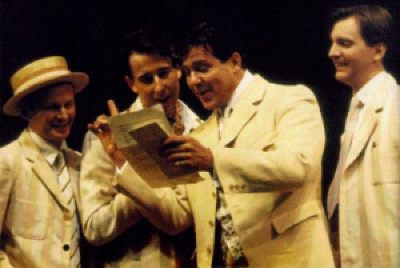Love's Labours Lost
 Love's Labours Lost by the RSC, 1995
Love's Labours Lost by the RSC, 1995Directed by Ian Judge
The Company:
Ferdinand, King of Navarre ... .....Philip Quast
Princess of France ... Jenny Agutter
Berowne ....... Richard Garnett
Rosaline ........Sarah
Longaville .... Bernard Wright
Katherine .......... Siān Radinger
Dumaine ........ Roger Moss
Maria ........ Emily Joyce
Richard O'Callaghan, John McAndrew, Arthur Cox, Raymond Bowers, Mike Burnside, John Hodgkinson, Sara Weymouth, Tudor Price, Anneli Harrison, Daniel Brown, Mark Shilton.
The Play:
Ferdinand, King of Navarre persuades his three friends, Berowne, Longaville and Dumaine to join him in giving up society and especially the company of women for three years so that they can concentrate on their studies. They have forgotten however that the beautiful Princes of France and her three gorgeous ladies in waiting are expected at any moment for a formal visit.
When the women arrive, each of the students promptly falls in love with one of them and although each tries to keep it a secret from his friends they are soon found out. Reconciled to the idea of being in love, the students now plan to court the ladies in disguise, but their plan is discovered and the ladies turn the table on them. Wearing masks they trick the students into declaring love to the wrong woman.
Review Love Labours Lost
Making Light of a Lesson in Love By Jack Tinker
The Mail 1st February 1995
Love's Labour's Lost, Shakespeare, The Barbican.
YOUTH knows it all. Then life teaches you that the longer you live, the less you can be sure of. This eternal irony lies at the heart of Shakespeare's lyrical conceit. Yet it can be a tedious conceit, watching the prissy King of Navarre and his high-minded celibate chums taught a basic lesson in love by a sharp-witted princess and her larky women.
Director Ian Judge has won an enviable reputation for putting the fun back into Shakespearean profundities. And he triumphantly does so once again. By transporting the court of Navarre to the banks of the Cam on the eve of 1914, he captures entirely the dichotomy between the sexes. Navarre (Philip Quast) and his coterie are the socially over-confident, sexually naive products of the English public school system. The Princess of France (Jenny Agutter, arriving piquantly by steam train) and her court are, by contrast, svelte New Women.
Prime combatants, as always in this play, are the laconic Berowne (Richard Garnett) whose cynicism does not travel far afield from the varsity debating society, and Rosaline (Sarah Woodward) whose pert and pretty presence is more than a match for a dozen such woebegone whippersnappers.
Miss Agutter has a little more difficulty convincing us that the Princess is also awesomely equipped in the department of intellect and wit. There is a little too much of the plodding recitation in her delivery. Nevertheless, the RSC's production is full of visual and verbal splendour, augmented by Nigel Hess's original music.
Once more Mr. Judge has stamped an impressively definitive style on one of the Bard's lighter works and turned it into pure delight.
He also injects an extra lesson not to trust life's certainties in the play's dying fall. As the young men stand resolute in their promise to wait a year and a day for their hard-won sweethearts, the horizon is lit by blood-red gunfire. It heralds the War to End All Wars which was to wipe out the flower of their generation.